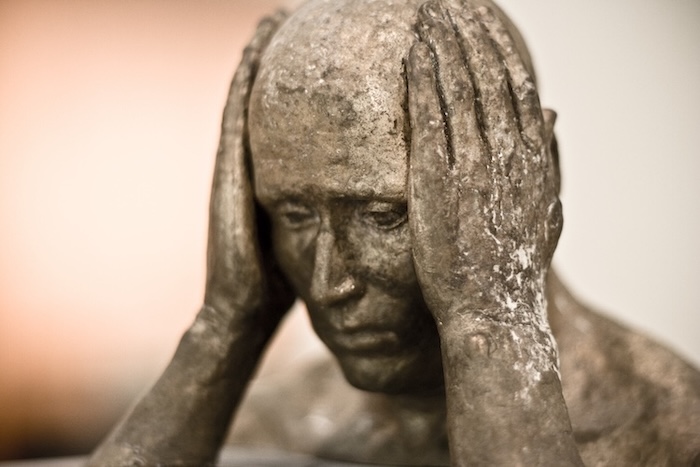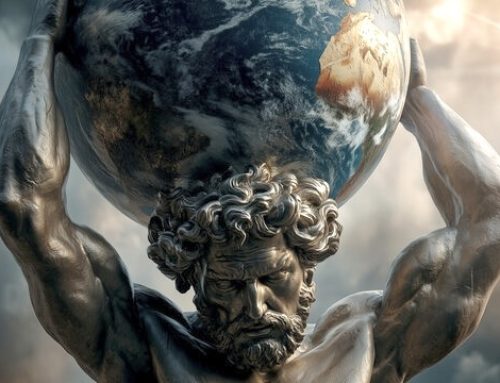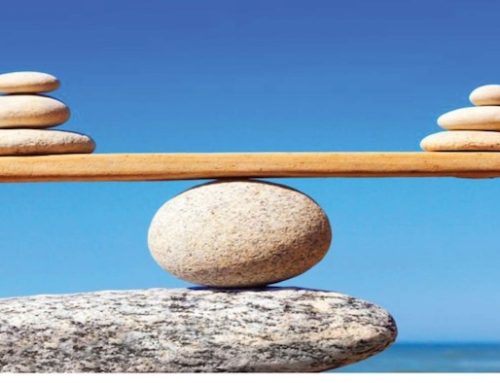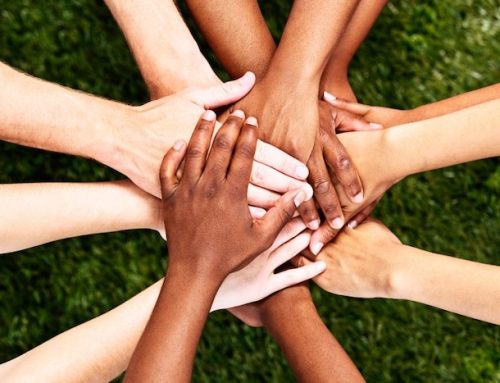There is much sadness in the world today. Sometimes I wonder if God isn’t sad, too. Although, if He actually exists, and is as He has always been purported to be, I doubt He regards us as much more than the latest iteration of the fallen. We are certainly not the first bunch to disappoint. The great religious texts of all flavors are loaded with the lamentations of man before his many gods. The entire idea of salvation is predicated upon screwing up. There can be no rebirth without first falling apart. Sin, redemption, and salvation. Order, disorder, and reorder. Thesis, antithesis, and synthesis. Triptychs dominate our mythologies and lore of renewal.
This is, of course, the promise of devotion: that out of suffering and sorrow hope emerges. That beliefs and behaviors change. That the good rises up to conquer evil. That the weak become powerful. That humanity finds itself again. That out of our suffering—to which we finally and sincerely surrender—we are reborn.
Embracing suffering is much more difficult, however, in our modern era of abundance. The last generation that truly suffered was my parents’ so-called Greatest Generation. Since the last crisis—the Great Depression and World War II—our collective sense of entitlement has made our society weaker in each decade and generation that followed. Today, the only strength entitlement provides is a strength of defiant stubbornness. We easily default into our claims of victimhood when events don’t favor us, while we fervently deny our own culpability. “Woe is me” has weirdly become an American refrain of patriotism. Do we need any further evidence of a sick society? Of one that is on the edge of collapse?
Anger, fear, deceit, blame, and shame are the coin of the realm in today’s America. They are nourished in the peat of hate, minted and fomented within our failing character. The rest of the world—both allies and adversaries—look on confused and bemused. Contempt is fast becoming their common bond. Neighbor-allies like Canada and historical adversaries like Russia have found contempt for America as common ground. However, this too shall pass. Eventually, their contempt will give way to pity. The failure of empires is seldom graceful and never pretty. The blaze of glory that defined the greatest superpower in the history of the world will not be extinguished with a whimper; it will drown in tears before it can be resurrected into a far more humble shell of its former grandeur. While deeply disappointing (okay, depressing), this process is both inevitable and natural.
The path forward toward renewal will not begin until we shift away from the hate-based emotions of anger, fear, deceit, blame, and shame. Look no further for proof of this claim than the modern movements in America. They all incorporate hate-based emotions and have largely failed, or are failing. Occupy Wall Street! Me Too! Black Lives Matter! Reparations! Deport Immigrants! And, yes: Make America Great Again! There is not a shred of love in any of them. No compassion. No empathy. No embrace of shared suffering. Yes, they can make the advocates or accusers in the movement feel better as a form of self-exorcism of their own demons and pain, but such relief is seldom enduring and always unilateral. Unsurprisingly, none of these movements achieved their intended aims to affect durable change. To borrow an idea from Xochitl Gonzalez in The Atlantic, these are moments rather than movements. Blame ‘n shame manipulates, but does not persuade. People may offer performative compliance—especially when shamed from an altar or political podium—but no substantive or enduring change. Lots of noise and vitriol and guilt, but no meaningful progress.
For positive change, we must all feel the pain. We must suffer. This is an unfortunate reality of being human. While we can endlessly craft solutions to our many issues, we are incapable of mustering the will to execute them successfully without suffering first. I grieve as I concede this point, but I surrender. As the Franciscan friar, Richard Rohr, wrote recently, “Until a divine form of compassion enters the scene … we do not enjoy the deep alchemy that morphs human rage and judgment into holy sadness.”[1] At Gettysburg, Abraham Lincoln called for “a new birth of freedom” in the face of unspeakable loss of life during the Civil War. All we have to accomplish today is simple deliverance, principally from ourselves. Our problem is not “out there,” it is within.
The political-minded among us argue ceaselessly for more progressive or more conservative principles and policies. They are all wrong. The objective of politics is power. More specifically, the power to make change for the benefit of our society. Whether that is based in conservative or liberal philosophy is irrelevant. What matters is whether or not we can persuade each other to change in a manner consistent with our objectives. This is not a red or blue issue; rather, it is one based in a shared destiny. Shared destinies have never been, nor will ever be, formed in the rotting compost of hate-based emotions. Moreover, they are based in truth—in reality. They are formed in the peril of suffering; in the sharing of misery. Suffering becomes a springboard to liberation and renewal. Shared misery produces love-based emotions.
Empathy is a love-based emotion. It is not weakness; nor is it a pathology. From the Greek word empatheia, meaning in-feeling-with. Together, not divided. Surprisingly, perhaps, it is a relatively young word in contemporary human discourse. In the late 19th century, the Germans were the first to study and apply the promise of “einfühlung,” or empathy. The English translation and origin of empathy did not come into being until 1908 when its contemplation was reserved for ‘feeling into’ objects of art and nature. Later, empathy became as we consider it today: the understanding of others and each other in a compassionate manner. And while it is love-based, it is not a romantic love; rather, the love of being where we see each other, we hear each other, and we feel the same things. As Saint Thomas Aquinas wrote in his theological summary in 1274, “To love is to will the good of the other.” Love, not hate, is the essence of what it means to be human—particularly in an era of abundance. Engaging in, or promoting, or otherwise condoning cruelty is obviously inhumane. Yet, we tolerate it from our leaders until it is inflicted upon us. This practice makes us as guilty as those who directly perpetrate cruelty.
Ironically, perhaps, in the 2024 election Democrats deployed blame ’n shame, while Trump and MAGA used empathy even though it was deployed as a form of manipulation. In particular, young men flocked to Trump. While the Democrats were focused on women’s reproductive rights and MeToo!, etc., MAGA showed empathy towards young men. In attracting the emerging “manosphere” David French, columnist for the New York Times recently wrote, “The manosphere succeeded not by refusing to condemn men and not by avoiding a moralizing tone, but by choosing to love them and by choosing to help them.” They made young men feel good about being young men, again. As I wrote last November following the election, in “A Conceit of Contempt,” contempt “was at the core of the losing campaign by Harris and the Democrats.” Although Trump expressed his contempt for “virtues and laws,” the Democrats aimed their contempt at groups of voters. Either way, contempt is certainly not love-based. It is not empathy. It is blame ‘n shame that repels rather than attracts.
“See me/feel me/heal me.” The popular rock band, The Who, sang this in 1969, during another time of national suffering. These empathetic practices could and should undergird the new period of enlightenment that emerges from tomorrow’s rubble. Where power becomes referential rather than coercive; the referent being the act that enables the well-being of others and results in an accumulation of power in the hands of the beneficent. Unlike coercive power that manipulates rather than persuades, and which spends power rather than accumulating it, referential power is the basis of enlightened altruism. If my actions improve your life, you will not only vote for me, you will empower me. Moreover, the conversation of a shared destiny, and the policies to affect it, will be cooperative rather than contentious. How nice would that be?
But first, the pain; the suffering; the sorrow. We must fail and pay for our failures before we will change our ways. At some point, we will face the real choice of wallowing in our devastation, or finding the resolve to produce our liberation. This is when strength of character overwhelms the strength of entitlement. All of the great religions and philosophers have illustrated this for us over and over throughout the history of humankind. Yet, the cycle has never been interrupted. As the Stoics would say, it is as it is. Now, deal with it. Our response becomes the measure of our worth, both individually and collectively.
What makes a prophet a prophet? Seeing things as they are and lighting the path to liberation. The necessity of sorrow is how things are, and the light of love is the way out. Out of sorrow comes power. The prophecy is simple. It is in our tears that we are freed. The sooner we embrace this, the sooner the suffering will end, and the sooner we will be reborn as a resilient and healthy society. No more enemies, no more victims, just grace.
[1] Richard Rohr, The Tears of Things: Prophetic Wisdom for an Age of Outrage (New York: Convergent Books, 2025), p. 100.






